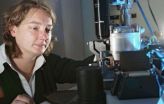(Press-News.org) Scientists at The University of Nottingham and the Wellcome Trust Sanger Institute near Cambridge have pin-pointed the 72 molecular switches that control the three key stages in the life cycle of the malaria parasite and have discovered that over a third of these switches can be disrupted in some way.
Their research which has been funded by Wellcome Trust and the Medical Research Council (MRC) is a significant breakthrough in the search for cheap and effective vaccines and drugs to stop the transmission of a disease which kills up to a million children a year.
Until now little has been known about the cellular processes involved in the development of this deadly disease. The research, published in the journal Cell Host & Microbe, involved the very first comprehensive functional analysis of protein kinases in any malaria parasite. It is also the largest gene knock-out study in Plasmodium berghei — a malaria parasite infecting rodents.
Dr Rita Tewari, in the School of Biology at The University of Nottingham, led the research. Dr Tewari said: "Blocking parasite transmission is recognised as an important element in the global fight to control malaria. Kinases are a family of proteins which contribute to the control of nearly all cellular processes and have already become major drug targets in the fight against cancer and other diseases. Now we have identified some key regulators that control the transmission of the malaria parasite. Work to develop drugs to eradicate this terrible disease can now focus on the best targets. This study shows how systematic functional studies not only increase our knowledge in understanding complexity of malaria parasite development but also gives us the rational approach towards drug development."
The life cycle of the malaria parasite is complex. Once the mosquito has feasted off infected blood fertilisation takes place within the mosquito. The deadly parasites are then injected back into another host in large numbers when the mosquito bites again. Once inside its mammalian host the parasite first infects the liver where it replicates again. After 48 hours millions of parasites are released into the red bloods cells of its host where they attack in vast numbers overwhelming their host producing high fever and sickness.
Dr Oliver Billker, an expert in pathogen genetics at the Wellcome Trust Sanger Institute, said: "This is a major leap forward — we can now set aside these 23 functionally redundant genes. This act of prioritisation alone has narrowed the set of targets for drug searches by a third.
"Our study demonstrates how a large scale gene knockout study can guide drug development efforts towards the right targets. We must now develop the technology to ask across the genome which pathways are important for parasite development and transmission."
As the malaria parasite becomes increasingly resistant to existing drugs and vaccines the race to find ways of blocking the transmission of malaria is becoming increasingly important. Last month the journal PLoS ONE published Dr Tewari's research which identified a protein, PF16, which is critical in the development of the malaria parasite — specifically the male sex cells (gametes) — which are essential in the spread by mosquitoes of this lethal parasite. The study, led by The University of Nottingham, found a way of disabling the PF16 protein.
In future studies, Dr Tewari's group is concentrating on the role of other signalling molecules like phosphatases, kinases and armadillo repeat proteins and their interaction in understanding malaria parasite development. The aim is to identify the best drug or vaccine target along the way.
The University of Nottingham has broad research portfolio but has also identified and badged 13 research priority groups, in which a concentration of expertise, collaboration and resources create significant critical mass. Key research areas at Nottingham include energy, drug discovery, global food security, biomedical imaging, advanced manufacturing, integrating global society, operations in a digital world, and science, technology & society.
Through these groups, Nottingham researchers will continue to make a major impact on global challenges.
###
END
Power plants that burn fossil fuels remain the main source of electricity generation across the globe. Modern power plants have scrubbers to remove sulfur compounds from their flue gases, which has helped reduce the problem of acid rain. Now, researchers in India have devised a way to convert the waste material produced by the scrubbing process into value-added products. They describe details in the International Journal of Environment and Pollution.
Fossil fuels contain sulfur compounds that are released as sulfur dioxide during combustion. As such, flue gas desulfurisation ...
Researchers from the University of Valencia (UV) have identified the effects of the way parents bring up their children on social structure in Spain. Their conclusions show that punishment, deprivation and strict rules impact on a family's self esteem.
"The objective was to analyse which style of parental socialisation is ideal in Spain by measuring the psychosocial adjustment of children", Fernando García, co-author of the study and a researcher at the UV, tells SINC.
The study, which has been published in the latest issue of the journal Infancia y Aprendizaje, was ...
INDIANAPOLIS – A study published earlier this year in the peer reviewed online journal BMC Public Health has found that residing in a neighborhood with adverse living conditions such as low air quality, loud traffic or industrial noise, or poorly maintained streets, sidewalks and yards, makes mobility problems much more likely in late middle-aged African Americans with diabetes.
"We followed a large group of African Americans for 3 years and found an extremely strong correlation between diabetes and adverse neighborhood conditions. The study participants were between ...
Jena (21 October 2010) Scientists from the Friedrich-Schiller-University Jena (Germany) were successful in improving a fabrication process for Atomic Force Microscopy (AFM) probe tips.
Atomic Force Microscopy is able to scan surfaces so that even tiniest nano structures become visible. Knowledge about these structures is for instance important for the development of new materials and carrier systems for active substances. The size of the probe is highly important for the image quality as it limits the dimensions that can be visualized – the smaller the probe, the smaller ...
PITTSBURGH—An analysis of plant and petroleum-derived plastics by University of Pittsburgh researchers suggests that biopolymers are not necessarily better for the environment than their petroleum-based relatives, according to a report in Environmental Science & Technology. The Pitt team found that while biopolymers are the more eco-friendly material, traditional plastics can be less environmentally taxing to produce.
Biopolymers trumped the other plastics for biodegradability, low toxicity, and use of renewable resources. Nonetheless, the farming and chemical processing ...
DURHAM, N.C. -- Being the right size and existing in the limbo between a solid and a liquid state appear to be the secrets to improving the efficiency of chemical catalysts that can create better nanoparticles or more efficient energy sources.
When matter is in this transitional state, a catalyst can achieve its utmost potential with the right combination of catalyst particle size and temperature, according to a pair of Duke University researchers. A catalyst is an agent or chemical that facilitates a chemical reaction. It is estimated that more than 90 percent of chemical ...
PITTSBURGH—Computer scientists at Carnegie Mellon University have devised an innovative and elegantly concise algorithm that can efficiently solve systems of linear equations that are critical to such important computer applications as image processing, logistics and scheduling problems, and recommendation systems.
The theoretical breakthrough by Professor Gary Miller, Systems Scientist Ioannis Koutis and Ph.D. student Richard Peng, all of Carnegie Mellon's Computer Science Department, has enormous practical potential. Linear systems are widely used to model real-world ...
DURHAM, N.C. -- Step aside copper and make way for a better carrier of information -- light.
As good as the metal has been in zipping information from one circuit to another on silicon inside computers and other electronic devices, optical signals can carry much more, according to Duke University electrical engineers. So the engineers have designed and demonstrated microscopically small lasers integrated with thin film-light guides on silicon that could replace the copper in a host of electronic products.
The structures on silicon not only contain tiny light-emitting ...
Growing up with lots of sisters makes a man less sexy. For rats, anyway. A new study published in Psychological Science, a journal of the Association for Psychological Science, finds that the sex ratio of a male rat's family when he's growing up influences both his own sexual behavior and how female rats respond to him.
David Crews, a psychobiologist at the University of Texas at Austin, is interested in how early life affects behavior later. This is an area that has received a lot of attention recently, such as research showing that the position of a fetus in the uterus ...
A commentary published in the journal, Science Translational Medicine, examines the structures of translational research investment in the UK.
The commentary has been written by researchers from the National Institute for Health Research (NIHR) comprehensive Biomedical Research Centre (BRC) at Guy's and St Thomas' and King's College London. The authors consider the results of substantial Government and charitable investment in translational research taking place within the NHS.
The commentary follows the progress of the research and development funding streams available ...




